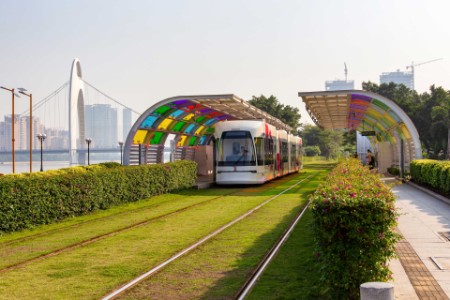Transitioning from “the red carpet" to “the green carpet" is imperative
In the early stages of economic reform and integration, the Vietnamese government adopted a “red carpet” strategy to attract investors by offering a variety of incentives. This approach proved to be highly effective, resulting in significant achievements in investment attraction. According to the Foreign Investment Agency of the Ministry of Planning and Investment, Vietnam has attracted approximately US$455 billion in registered FDI (with US$290 billion executed) as of September 2023, making the country a top FDI destination in ASEAN. Currently, Vietnam remains a compelling choice for investment.
The “red carpet” approach, which emphasizes tax incentives, infrastructure support, post-investment assistance, and other policies to reduce investment costs, however, is encountering challenges.
This article discusses key issues, based on professional observations, and input from various stakeholders, both domestic and international levels.
A first hurdle is the global common rules that Vietnam must adhere to, such as the Global Minimum Tax (GMT), which diminishes the appeal and attractiveness of Vietnam's current tax incentives, necessitating Vietnam to implement far-reaching changes.
Another challenge results from internal economic changes, such as the waning advantages of a young workforce and affordable labor costs. Vietnam is also shifting its focus toward attracting higher-quality foreign investment to climb up the global supply chain.
Moreover, the impacts of climate change and increasing consumer concerns over environmental issues are gradually alter their consuming behaviors. EY Future Consumer Index, released in November 2023, involving over 22,000 participants from 28 countries, including Vietnam, shows that 46% of consumers extremely concerned about climate change. The percentage of consumers that have already started to buy products that protect them from the climate impact is also high, at 25%. These shifts compel manufacturers in Vietnam and globally to integrate sustainable development to meet these "green" consumer demands.
As being heavily impacted by climate change, Vietnam has implemented substantial policy reforms to attract investments and actively participates in global initiatives to promote and pursue sustainable development strategy. Additionally, Vietnam has pledged to achieve net-zero emissions by 2050.
Rolling out the “green carpet" and its policy implications
The “green carpet” means an approach that aims to promote sustainable policies and solutions to attract high-quality investments, enabling Vietnam to maintain and enhance its investment attraction status while preparing for new investment opportunities. This approach prioritizes innovative and knowledge-based industries over traditional ones like manufacturing or resource extraction.
Prime Minister Pham Minh Chinh's approval of the Foreign Investment Cooperation Strategy for 2021-2030, as stated in Decision No. 667/QĐ-TTg dated June 2, 2022, emphasizes the attraction of high-tech, modern management projects with significant value-addition and positive impacts on the global supply chain. To achieve this goal, Vietnam must implement specific solutions to meet investors' urgent needs and align with sustainable development goals, in addition to general solutions such as macroeconomic stability, infrastructure improvement, and human resource quality.
From the author’s observation, electricity supply is a major concern for investors, with stability and integration of renewable energy sources being critical factors. To achieve a carbon-neutral power grid by 2040, many major investors have joined RE100 and committed to using 100% renewable energy in their production activities. Several prominent foreign investors in Vietnam are part of this list and have established specific implementation timelines.
Vietnam must quickly finalize regulations to support investors in meeting their renewable energy commitments. Implementation of the Direct Power Purchase Agreement (DPPA), which allows customers to purchase electricity directly from renewable energy projects, is strongly recommended. This will enable investors to access and consume green energy, rather than solely relying on purchasing emission reduction certificates to fulfill their commitments.
Furthermore, Vietnam should encourage the development of green industrial zones. The government has taken steps towards new models of industrial parks by issuing Decree 35/2022/ND-CP on 28 May 2022. The decree includes provisions pertaining to new industrial park models, contributing to policy enhancement and fostering investor confidence in constructing eco-friendly industrial zones, thereby promoting sustainable development. Additionally, it encourages the conversion of existing industrial parks into ecological industrial zones.
To enact the policy, it is recommended that local authorities actively attract reputable investors who can help develop successful green industrial zone models in Vietnam. Industrial zone development should prioritize connecting and enhancing social responsibility towards workers and surrounding communities.
In addition, the government should continue to coordinate with domestic and international professional organizations to promote, build, and recommend or issue a comprehensive set of ESG (Environmental, Social, and Governance) standards, as well as mandatory reporting requirements for diverse types of businesses. The presence of multiple standards such as CIS, ISO26000, or VNSI, each with their own set of criteria from various organizations, has posed challenges and confusion for businesses when it comes to selecting and implementing them.
Latest trends and robust transformations of the global economy exert significant pressure on the shift of Vietnam's economy and foreign investment attraction policy. Vietnamese government should be flexible and adaptive in their policies to stay competitive in the new game.
This article was first published in Vietnam Investment Review on 1 January 2024.


